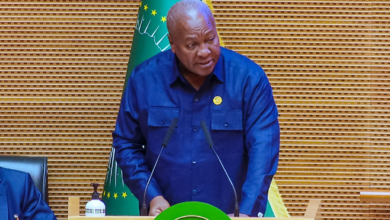Beyond Conflict, A Plan for Africa’s Food Security
A foreign war has exposed Africa’s chronic dependence on food imports and galvanized action to address the nexus between conflict, food insecurity and climate change…
By Patrick Verkooijen, Anne Beathe Tvinnereim and Akinwumi Adesina.
The victims of war are sometimes a thousand miles from the battlefield. Such is the case with Russia’s brutal invasion of Ukraine. For while the fighting there is causing immeasurable suffering and destruction, it also threatens to trigger a silent disaster in Africa.
The conflict has caused food prices to rise. This situation is difficult for the 283 million people already starving on the continent. The war in Ukraine has also highlighted Africa’s chronic dependence on food imports. Wheat imports account for around 90% of Africa’s $4 billion trade with Russia and nearly half of the continent’s $4.5 billion trade with Ukraine. Sanctions imposed on Russia disrupted grain shipments at a time when global inventories were already low. This situation now raises the specter of widespread famine in a continent dependent on imported food for its sustenance.
« Now more than ever it is time to massively increase food production in Africa »
In fact, Africa’s food crisis has been looming for some time. Climate change is disrupting weather patterns and harming agriculture, not just in Africa but in many parts of the world. This phenomenon is also behind the sharp rise in food prices, which have not been this high in almost half a century. Apart from wars, climate change is probably the greatest threat to the world’s food security. There is an urgent need to find sustainable and long-term solutions that will allow agriculture to adapt to the warming of our planet.
In response to this situation, the African Development Bank and its partners want to mobilize $1 billion to boost wheat and other food production in Africa. The goal is to help 40 million farmers increase their production of wheat, rice, soybeans and other heat-tolerant crops to feed around 200 million people. Central to this effort is the need to train farmers in new techniques to increase their resilience to the impacts of climate change. To feed a fast-growing and hungry continent, farmers must produce more with fewer resources while dealing with erratic weather patterns, floods, droughts, the spread of pathogens and loss of biodiversity.
Through the Africa Adaptation Acceleration Program, an African initiative launched last year to reduce the continent’s vulnerability to the impacts of climate change, the Global Center for Adaptation (GCA) and other development partners are already working to equip small-scale producers, who provide most of the food, with resilience techniques against climate change to provide climate change production in Africa.
According to the GCA, investing in climate-resilient farms in Africa costs less than a tenth of the damage caused by climate-related disasters, including crop losses, disaster relief, rebuilding and road repairs. For sub-Saharan Africa, these sunk costs are estimated at US$201 billion per year, while the investments required for climate adaptation in agriculture are estimated at US$15 billion, again according to GCA.
« In Africa, climate change could permanently lose 15% of gross domestic product by 2030. That means another 100 million people will fall into poverty by the end of the decade »
Farmers in sub-Saharan Africa face the combined challenges of rapid climate change, malnutrition and population growth. Faced with this challenge, they need plants that are more resilient, productive and nutritious. These changes need to happen quickly and at scale. In Africa, climate change could permanently lose 15% of gross domestic product by 2030. That means another 100 million people will fall into poverty by the end of the decade.
Protecting the continent’s rich biodiversity is one way to increase agricultural yields and find new crop varieties better suited to drier and hotter climates. Genebanks store thousands of valuable plant samples that scientists can use to develop better varieties, but they have faced years of funding and staffing shortages, threatening plant collections and future food security.
The BOLD project managed by the Crop Trust and funded by Norway and the European Union provides financial and technical support to gene banks in Nigeria, Zambia, Kenya, Ethiopia and Ghana to meet international operating standards and ensure collections are safe and viable over the long term.
With soaring food prices and disrupted supplies due to conflict, Africa must mobilize as many climate-resilient solutions as possible, quickly and at scale, to defeat the climate change threat. Investing in agricultural climate adaptation is the smartest and most beneficial way to ensure food security on the continent. Let’s not waste our time.
*Patrick Verkooijen, Director General of the Global Center for Adaptation, Anne Beathe Tvinnereim, Norwegian Minister for International Development and Akinwumi Adesina, President of the African Development Bank.






